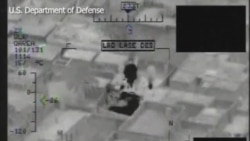PENTAGON —
U.S. military drones have been a primary tool in a war that the United States wants to execute with a light footprint: Few U.S. troops on the ground and a focus instead on building the capacity of African forces.
But recent raids in Somalia and Libya, both involving Special Forces, show it's going to take a combined effort in what President Barack Obama says will have to be a prolonged campaign.
“Africa is one of the places where — because in some cases, lack of capacity on the part of the governments, in some cases because it is easier for folks to hide out in vast terrains that are sparsely populated — that you're seeing some of these groups gather," he said. "And we're going to have to continue to go after them."
Until recently, drone strikes had been the U.S. method of choice for getting terrorists. But recent strikes in places such as Yemen, where villagers said civilians were killed by the remotely piloted aircraft, have created an image problem for the United States.
Obama signaled a shift in tactics during a speech in May, saying "progress we have made against core al-Qaida will reduce the need for unmanned strikes.”
That shift is the result of outcry overseas and also in the U.S., where the administration's drone policy is a target of activists.
Joseph Siegle, director of research at the U.S. Defense Department's Africa Center for Strategic Studies, says the change is key to building and protecting partnerships on the continent.
"There's a realization this is a long war. It's not just a series of missions," he said. "And to win that longer war, you need to win the support of the populations in which these terrorist activities are taking place. And you're not going to do that if you cause many civilian casualties and the U.S. is blamed for embroiling these countries."
The U.S. government says it prefers to capture, interrogate, and prosecute terrorists — mainly by using Special Forces.
But putting U.S. troops on the ground, regardless of how small their numbers are, carries other risks, and polls show Americans don't favor involvement in another war.
The Hollywood film "Black Hawk Down" depicted the downing of a U.S. helicopter in Somalia 20 years ago this month, during the battle of Mogadishu. In that incident, 18 Americans were killed. Americans are in no mood for a repeat.
But recent raids in Somalia and Libya, both involving Special Forces, show it's going to take a combined effort in what President Barack Obama says will have to be a prolonged campaign.
“Africa is one of the places where — because in some cases, lack of capacity on the part of the governments, in some cases because it is easier for folks to hide out in vast terrains that are sparsely populated — that you're seeing some of these groups gather," he said. "And we're going to have to continue to go after them."
Until recently, drone strikes had been the U.S. method of choice for getting terrorists. But recent strikes in places such as Yemen, where villagers said civilians were killed by the remotely piloted aircraft, have created an image problem for the United States.
Obama signaled a shift in tactics during a speech in May, saying "progress we have made against core al-Qaida will reduce the need for unmanned strikes.”
That shift is the result of outcry overseas and also in the U.S., where the administration's drone policy is a target of activists.
Joseph Siegle, director of research at the U.S. Defense Department's Africa Center for Strategic Studies, says the change is key to building and protecting partnerships on the continent.
"There's a realization this is a long war. It's not just a series of missions," he said. "And to win that longer war, you need to win the support of the populations in which these terrorist activities are taking place. And you're not going to do that if you cause many civilian casualties and the U.S. is blamed for embroiling these countries."
The U.S. government says it prefers to capture, interrogate, and prosecute terrorists — mainly by using Special Forces.
But putting U.S. troops on the ground, regardless of how small their numbers are, carries other risks, and polls show Americans don't favor involvement in another war.
The Hollywood film "Black Hawk Down" depicted the downing of a U.S. helicopter in Somalia 20 years ago this month, during the battle of Mogadishu. In that incident, 18 Americans were killed. Americans are in no mood for a repeat.










